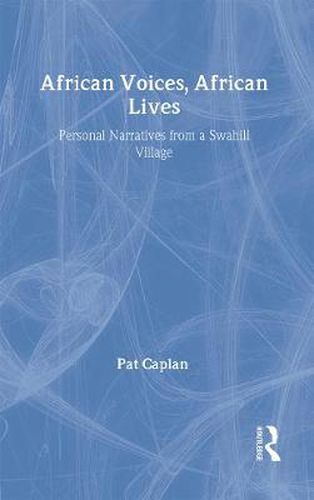Readings Newsletter
Become a Readings Member to make your shopping experience even easier.
Sign in or sign up for free!
You’re not far away from qualifying for FREE standard shipping within Australia
You’ve qualified for FREE standard shipping within Australia
The cart is loading…






African Voices, African Lives explores the world of ‘Mohammed’, a swahili peasant living on Mafia Island, Tanzania. Through his own words - some written, some spoken - and those of his relatives, including his ex-wife and one of his daughters, he enables us to see the world through his eyes, including the invisible world of spirits which plays a significant role in his life. This information is gathered by Pat Caplan, the anthropologist, over almost three decades of talking and writing to each other. She acts not only as translator and editor, but also as interpreter, bringing in her own knowledge gathered from field data as well as comparative material from other anthropological work. By utilising a mixture of styles - narrative and life history, ethnographic observation, and the diary kept by Mohammed at the anthropologist’s bequest, African Voices, African Lives will make an important contribution to current debates in anthropology by grappling with issues raised by ‘personal narratives’, authorial authority, and with reflexive ethnographic writing.
$9.00 standard shipping within Australia
FREE standard shipping within Australia for orders over $100.00
Express & International shipping calculated at checkout
African Voices, African Lives explores the world of ‘Mohammed’, a swahili peasant living on Mafia Island, Tanzania. Through his own words - some written, some spoken - and those of his relatives, including his ex-wife and one of his daughters, he enables us to see the world through his eyes, including the invisible world of spirits which plays a significant role in his life. This information is gathered by Pat Caplan, the anthropologist, over almost three decades of talking and writing to each other. She acts not only as translator and editor, but also as interpreter, bringing in her own knowledge gathered from field data as well as comparative material from other anthropological work. By utilising a mixture of styles - narrative and life history, ethnographic observation, and the diary kept by Mohammed at the anthropologist’s bequest, African Voices, African Lives will make an important contribution to current debates in anthropology by grappling with issues raised by ‘personal narratives’, authorial authority, and with reflexive ethnographic writing.